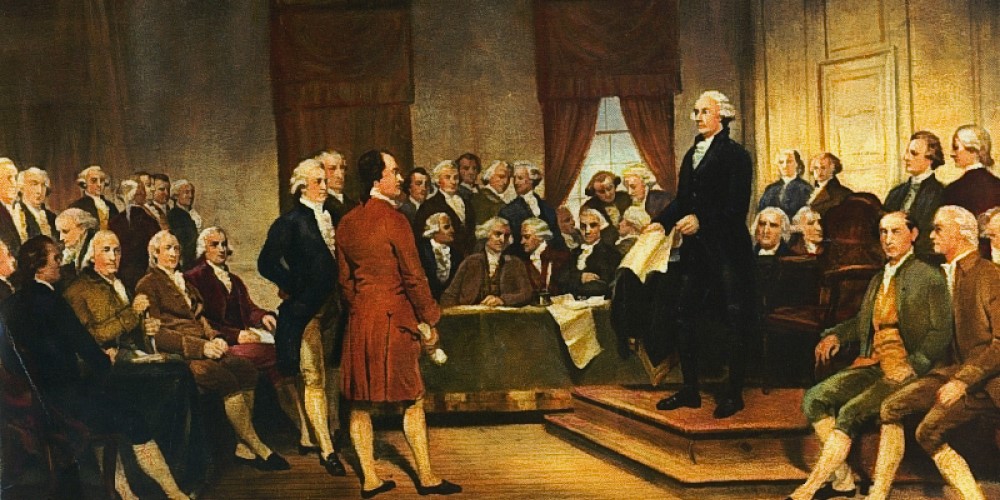We Can Do Better Than the Framers' Constitution
Adrian Vermeule’s recent essay in the Atlantic sketches an alternative to originalism, which today is the dominant theory of constitutional interpretation amongst conservatives and the one associated with the Supreme Court justice after whom my law school is named. In its place, Vermeule proposes a “common good” paternalism that candidly enforces conservative principles about hierarchy, solidarity, and personal morality.
As provocative as this is, Vermeule nevertheless pulls his punches. Rather than arguing that conservatives should reject originalism, he might have argued that they must do so if they wish to advance a morally compelling argument. For originalism, after all, is simply another form of legal positivism, the doctrine that places a Chinese Wall between what is and what ought to be the law. Originalists are the children of John Austin (1790-1859), the English legal philosopher who defined the law as the sovereign’s command backed by force. As a utilitarian, Austin thought that laws might serve the principle of utility or not, that is, they might be good or bad, but in either case they’re still laws if enacted by the King-in-Parliament.
As a form of legal positivism, therefore, it makes no sense to say that courts should follow originalist principles, unless the alternative is expected to make things worse. And that is what originalism comes down to. Its plausibility as a rule that deserves to be followed rests on a rejection of its principal alternative—the left-liberal egalitarianism and libertarianism that informs much of our constitutional law—and an assertion that those are the only choices before us.
As such, originalism is necessarily a political creed that seeks to hide its politics. But as Karl Llewellyn noted, covert tools are never reliable tools. When the hidden motives are exposed, the originalist can be ridiculed as insincere, and that is what liberals have done in exposing his biases.
The conservative has a sense of human frailty and distrusts laws cast in stone, including constitutions.
If originalism commends itself, then, it must be because the Framers’ Constitution is morally superior to today’s Constitution. That explains the temptation amongst some originalists to discover natural law principles in the Constitution. If one reads the Framers’ debates, however, you’ll mostly search in vain for Thomism or Lockean natural rights. Nor can one argue that, sub silento, they were there all along, that they were in the air that everyone breathed. The problem here is that you can sneak in almost anything you want on that argument, Christianity for example. Worse still, many of the Framers espoused views that were seemingly inconsistent with natural law principles. Think here of James Madison’s sense of fallen humanity, Gouverneur Morris’ cynicism, and John Dickinson’s Burkean conservatism.
Should you still wish to argue for the moral superiority of the Framers’ Constitution, pray what have you to say about the Fugitive Slave Clause in Art. IV, sec. 2, cl. ii, which the Committee of Eleven snuck into the draft constitution on Sept. 4, 1787.
No Person held to Service or Labour in one State, under the Laws thereof, escaping into another, shall, in Consequence of any Law or Regulation therein, be discharged from such Service or Labor, but shall be delivered up on Claim of the Party to whom such Service or Labour may be due.
The Clause, along with a 1793 statute which established rules for the capture of escaped slaves, did not require Northerners to return escaped slaves to their masters, but such duties were imposed by the 1850 Fugitive Slave Act. This infuriated abolitionists, and in 1854 William Lloyd Garrison burned a copy of the statute at a public meeting in Framingham, MA. He then held up a copy of the Constitution and burned it as well, calling it “a covenant with death, and an agreement with hell.” Henry David Thoreau was on the podium, and spoke next. Taking aim at legal positivism, the author of Walden said that “Law will never make men free; it is men who have got to make the law free.”
Today the written Constitution includes the Reconstruction Amendments that nullified the Fugitive Slave Clause. But if we thought that Garrison was not altogether wrong in 1854, does that mean that the Framers in 1787 were something less than oracles of the law, and became so only in 1865?
Other Framers’ beliefs seem either questionable or very dated now. There are few people today, conservatives included, who share the Framers’ inordinate fear of democracy. The Framers did not think presidents should be chosen in popular elections. They thought that states had the right to secede from the union. And while they thought that a separation of powers was necessary to preserve liberty, the evidence today is that parliamentary regimes are freer than presidential ones.
In sum, originalism is a form of legal positivism and as such is devoid of moral force, except as a covert method of subverting a dominant left-liberal tradition. But originalism’s insincerity condemns it, and like Vermeule, the honest conservative should openly oppose left-liberalism (even if there are few people who’ll be tempted by Vermeule’s Catholic Integralism).
Originalism is a radical creed and as such is anything but conservative. Instead, the conservative has a sense of human frailty and distrusts laws cast in stone, including constitutions. The want of reversibility—both of constitutional text and of legislative acts—is indeed the Constitution’s great problem. Our constitutional system operates on the assumption that bad bills will not survive the winnowing they receive through the need for approval by House, Senate, and White House. But that has not saved us from wasteful laws. And in any event, the conservative—apt to prefer ex post reversibility under a parliamentary system to ex ante screening under the separation of powers—will think this an example of Hayek’s fatal conceit. Similarly, the conservative will be unwilling to think that one group of people in 1787 got it exactly right, and that one needn’t attend to what wise jurists since then have added to our understanding of the Constitution. You can be an originalist or a Hayekian, but you can’t be both.
A conservative in the mold of John Dickinson will mistrust grand theories and prefer to be guided by experience. He’ll not think that anyone has a privileged understanding of the Constitution—not the Framers in 1787 and not the great jurists who since then have ruled on it. He’ll know that, given the barriers to formal amendments, change must come incrementally, from the bench. Without advancing radical new proposals, and without assuming that existing constitutional principles cannot be improved upon, he’ll expect the conservative jurist to curiously test existing laws, identify the ones that need revision, and correct them. Which is what wise judges have always tried to do.



